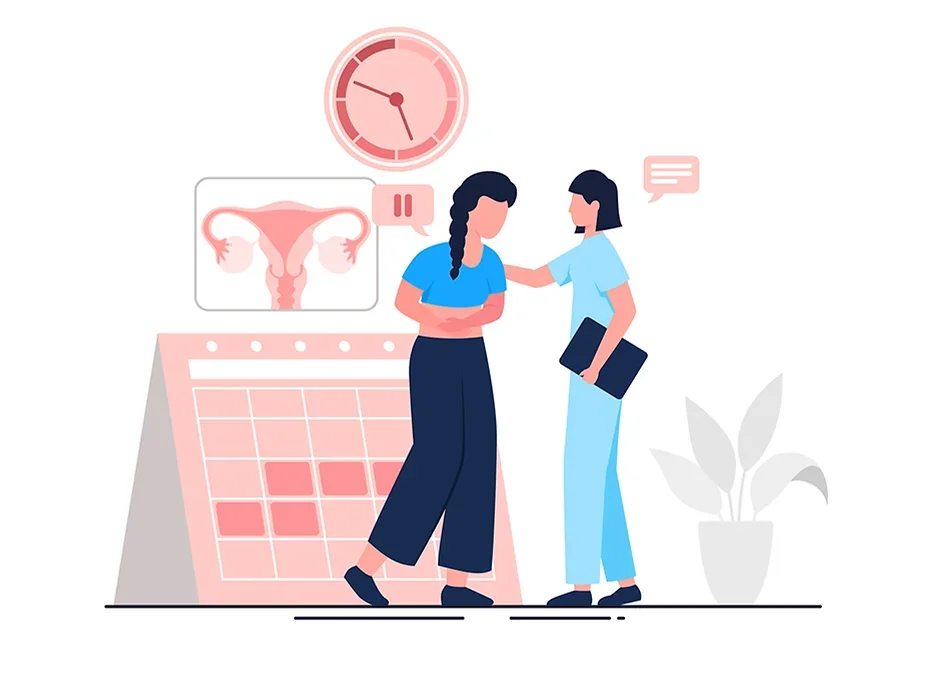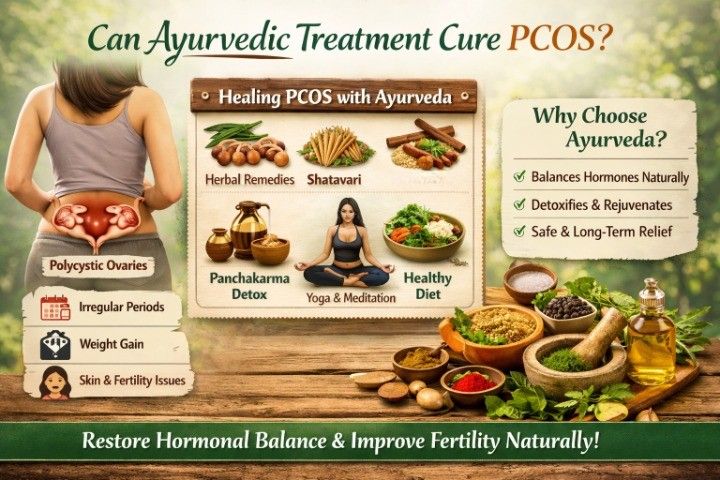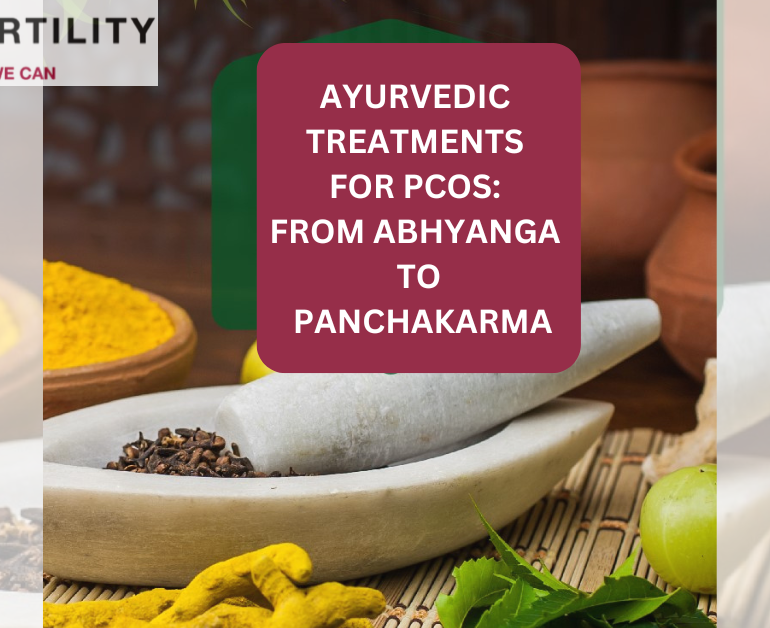PCOD and PCOS are endocrine illnesses that include hormonal abnormalities, specifically insulin resistance and androgen excess. Multiple cysts that form on the ovaries in PCOS cause irregular menstrual periods and make conception difficult. Although PCOD and cysts are similar, PCOD does not usually occur with cysts.
The two most common hormonal illnesses affecting women in their reproductive years are Polycystic Ovary Syndrome (PCOS) and Polycystic Ovary Disorder (PCOD). If left ignored, its symptoms can be upsetting and result in some consequences. Ayurveda is the traditional Indian medical system that offers a comprehensive strategy for managing PCOD/PCOS through dietary changes, lifestyle adjustments, and herbal therapies, while conventional medicine offers medications.
Signs and Symptoms of PCOD and PCOS
The following symptoms may be present in your body if you have:
- irregular menstrual cycles;
- excessive hair growth;
- acne;
- weight gain or trouble losing weight;
- thinning or balding hair;
- darkening of the skin, particularly in the groin, beneath the breasts, and along neck creases
- Mood swings and despair
- Infertility or difficulty conceiving
Why do PCOD and PCOS Happen in Women?
Although the precise origin of PCOD/PCOS is unknown, a mix of genetic, environmental, and lifestyle variables is thought to be involved. These disorders are largely caused by insulin resistance, hormonal abnormalities (particularly high androgen levels), and inflammation.
Effects of PCOD/PCOS on the body
PCOD/PCOS can affect the body in several ways such as:
- Impaired ovulation leading to infertility;
- Insulin resistance increases the risk of type 2 diabetes and cardiovascular problems
- Distress and a lower standard of living as a result of symptoms such as hirsutism, acne, and irregular menstruation cycles
- Prolonged side effects include endometrial cancer brought on by sporadic or non-existent menstrual cycles, which can cause an abnormal thickening of the uterine lining.
Ayurveda Treats pcod and pcos Effectively
As per the Ayurvedic doctor for PCOS, ayurveda treats PCOD/PCOS effectively by addressing the underlying cause of the condition, with a focus on holistic recovery. Ayurvedic treatments work to balance the doshas, enhance digestion, and detoxify the body to restore hormonal equilibrium. Here are a few ways that Ayurveda can assist in PCOD/PCOS management:
- Herbal remedies: Ayurvedic herbs can help regulate menstrual cycles, lower inflammation, and increase fertility known for their hormone-balancing qualities.
- Pranayama and yoga: Certain breathing techniques and yoga poses can help lower stress, enhance blood flow to the reproductive organs, and regulate hormone levels.
- Panchakarma therapy: This cleansing technique enhances metabolism, helps the body get rid of impurities, and balances hormones.
- Dietary adjustments: Ayurveda strongly emphasises the role nutrition plays in preventing and curing illness. The main goals of a diet for PCOD/PCOS patients are to regulate blood sugar, lower inflammation, and promote hormonal balance.
Ayurvedic Diet and Nutrition for PCOD/PCOS Management
Following are some of the tips for you to follow regarding diet and nutrition-
- Place a focus on whole foods: Make sure your diet is rich in fresh produce, whole grains, legumes, nuts, and seeds. These foods are high in antioxidants, vitamins, minerals, and fibre, which help lower inflammation and control blood sugar levels.
- Select foods with a low glycemic index (GI): choose foods with a low GI to avoid blood sugar rises. Whole grains like quinoa, barley, and oats are a few examples, along with non-starchy veggies and legumes.
- Include healthy fats: Include foods high in avocados, nuts, seeds, olive oil, and fatty fish in your diet as sources of healthy fats. Good fats aid in the synthesis of hormones and lessen inflammation.
- Minimise your intake of refined carbohydrates and sugars: These foods and drinks can exacerbate insulin resistance and induce insulin spikes. Try to avoid or consume them as little as possible. Processed foods, sugary snacks, sodas, and desserts fall within this category.
- Control portion sizes: pay attention to portion proportions to avoid overindulging and to keep your weight in check. Eat with awareness and pay attention to your signals of hunger and fullness.
- Remain hydrated: drink lots of water during the day to aid with detoxifying and preserve general health. For the treatment of PCOD/PCOS, herbal teas such as fenugreek, cinnamon, and spearmint teas may be helpful.
You will get the best Ayurvedic doctor for pcod/pcos at Ayu Fertility
We at Ayu Fertility provide customized Ayurvedic therapies for PCOD/PCOS that target the underlying physiological imbalances. Our skilled ayurvedic doctor for Pcos designs individualized treatment regimens that may incorporate Panchakarma therapy, yoga, herbal treatments, dietary and lifestyle changes, and stress-reduction methods. We aim to increase general well-being, improve fertility, and restore hormonal balance with a comprehensive approach.
Therefore, PCOD/PCOS can have a serious negative influence on the fertility of women and quality of life, but it can be properly treated with the correct treatment plan. Ayurveda provides a comprehensive and all-natural method of treating the condition by treating the underlying causes of PCOD/PCOS and fostering bodily equilibrium. You can control PCOD/PCOS symptoms and enhance your general health and well-being by adopting ayurvedic concepts into your lifestyle, such as dietary adjustments, herbal therapies, and stress-reduction methods. Get customized Ayurvedic treatment for PCOD/PCOS from the best Ayurvedic doctor for PCOS at Ayu Fertility for long-term alleviation and long-lasting health gains.




